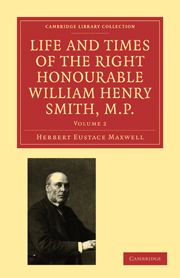Book contents
- Frontmatter
- Contents
- ILLUSTRATIONS TO THE SECOND VOLUME
- CHAPTER I 1878–1880
- CHAPTER II 1880–1881
- CHAPTER III 1882–1884
- CHAPTER IV 1880–1885
- CHAPTER V 1871–1891
- CHAPTER VI 1885
- CHAPTER VII 1886–1887
- CHAPTER VIII 1887
- CHAPTER IX 1888
- CHAPTER X 1889
- CHAPTER XI 1890
- CHAPTER XII 1891
- CHAPTER XIII 1891
- APPENDIX
- INDEX
- Plate section
CHAPTER III - 1882–1884
Published online by Cambridge University Press: 29 August 2010
- Frontmatter
- Contents
- ILLUSTRATIONS TO THE SECOND VOLUME
- CHAPTER I 1878–1880
- CHAPTER II 1880–1881
- CHAPTER III 1882–1884
- CHAPTER IV 1880–1885
- CHAPTER V 1871–1891
- CHAPTER VI 1885
- CHAPTER VII 1886–1887
- CHAPTER VIII 1887
- CHAPTER IX 1888
- CHAPTER X 1889
- CHAPTER XI 1890
- CHAPTER XII 1891
- CHAPTER XIII 1891
- APPENDIX
- INDEX
- Plate section
Summary
The condition of things in Ireland, when Parliament reassembled on February 7, 1882, had gone from bad to worse, and the Government had to ask for fresh powers to deal with it. By way of counterpoise to their new Coercion Bill, they introduced at the same time an Arrears of Rent Bill, providing for the suspension of proceedings against defaulting tenants and the wiping out or reduction of arrears. These two measures were pressed, forward pari passu, and occupied the greater part of the session. Mr Gladstone, before the meeting of Parliament, had declared that further reform of the Rules of Procedure was of paramount necessity, and on January 30 Smith announced that he and his colleagues would consent to any reasonable changes in the rules, but objected to closure by a bare majority.
Smith's colleague in the representation of Westminster, Sir Charles Russell, was obliged to resign his seat at this time owing to ill health, and the Conservative party in the borough unanimously selected Lord Algernon Percy, second son of the Duke of Northumberland, as their candidate. The nomination took place on February 10, and, for the first time in its history, Westminster elected a Conservative without opposition—remarkable evidence of the powerful influence which Smith had established upon its political character. It was the general belief that the electors would have accepted any candidate whom their senior member had chosen to suggest.
- Type
- Chapter
- Information
- Publisher: Cambridge University PressPrint publication year: 2010First published in: 1893

